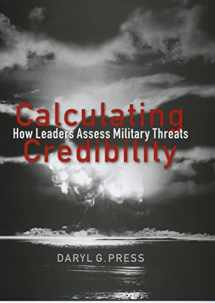
Calculating Credibility: How Leaders Assess Military Threats (Cornell Studies in Security Affairs)
Book details
Summary
Description
Calculating Credibility examines―and ultimately rejects―a fundamental belief held by laypeople and the makers of American foreign policy: the notion that backing down during a crisis reduces a country's future credibility. Fear of diminished credibility motivated America's costly participation in the Korean and Vietnam wars, and, since the end of the Cold War, this concern has continued to guide American policy decisions. Daryl G. Press uses historical evidence, including declassified documents, to answer two crucial questions: When a country backs down in a crisis, does its credibility suffer? How do leaders assess their adversaries' credibility? Press illuminates the decision-making processes behind events such as the crises in Europe that preceded World War II, the superpower showdowns over Berlin in the 1950s and 60s, and the Cuban Missile Crisis.
When leaders face the prospect of high-stakes military conflicts, Press shows, they do not assess their adversaries' credibility by peering into their opponents' past and evaluating their history of keeping or breaking commitments. Power and interests in the current crisis―not past actions―determine the credibility of a threat. Press demonstrates that threats are credible only if backed by sufficient power and only if pursuing important interests. Press believes that Washington's obsession with the dangers of backing down has made U.S. foreign policy unnecessarily rigid. In every competitive environment―sports, gambling, warfare―competitors use feints and bluffs to tremendous advantage. Understanding the real sources of credibility, Press asserts, would permit a more flexible, and more effective, foreign policy.


We would LOVE it if you could help us and other readers by reviewing the book
Book review



